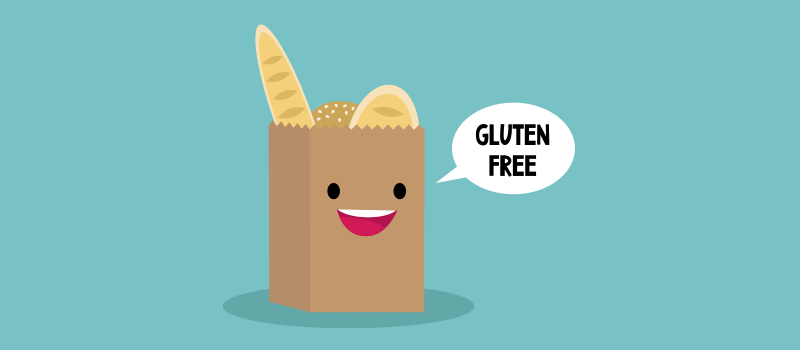What is Gluten, and What is a Gluten-Free Diet?
Grains such as wheat, barley, and rye contain a protein called gluten. Gluten provides dough with flexibility, aids in rising, and helps it hold its shape. Many people can include gluten in a healthy diet, but some can have negative health consequences.
When following a gluten-free diet, any food containing gluten is avoided. This entails staying away from goods manufactured from triticale, a hybrid between wheat and rye, barley, and wheat. Fruits, vegetables, dairy products, beef, chicken, fish, and gluten-free grains like quinoa and rice are the main components of a gluten-free diet.
Gluten-Free Food Items
Transitioning to a gluten-free diet might seem challenging, but there are plenty of delicious and nutritious options available:
- Fruits and Vegetables: Fresh, frozen, or dried fruits and vegetables.
- Meat and Poultry: Fresh, unprocessed meat and poultry.
- Fish and Seafood: Fresh or frozen fish and seafood.
- Dairy: Milk, cheese, butter, and yogurt (check for additives).
- Gluten-Free Grains: Rice, quinoa, buckwheat, millet, amaranth, and oats (certified gluten-free).
- Legumes: Beans, lentils, and chickpeas.
- Nuts and Seeds: Almonds, walnuts, chia seeds, and flaxseeds.
- Gluten-Free Flours: Almond flour, coconut flour, and rice flour.
Challenges in a Gluten-Free Diet
Adopting a gluten-free diet can bring numerous health benefits, but it also comes with its own set of challenges. One of the primary difficulties is the limited availability and higher cost of gluten-free products. Many specialty items, like gluten-free bread and pasta, are often more expensive than their gluten-containing counterparts, making it financially burdensome for some individuals.
Another challenge is ensuring a balanced and nutrient-rich diet. Gluten-containing grains are often fortified with essential nutrients like iron and B vitamins, which may be lacking in a gluten-free diet. Withuals might miss these vital nutrients beneficial for planning, leading to potential deficiencies.
Social situations and dining out can also pose significant challenges. Many restaurants and social gatherings do not cater to gluten-free diets, making finding safe and suitable food options challenging. Cross-contamination is a constant concern, as even trace amounts of gluten can trigger symptoms in sensitive individuals.
Lastly, there is the challenge of vigilance. Reading labels and understanding ingredients become crucial, as gluten can be hidden in many processed foods, sauces, and condiments. Maintaining a strict gluten-free diet requires continuous effort and awareness, which can be overwhelming for some individuals. Despite these challenges, maintaining a gluten-free diet can be manageable and rewarding with the proper support and resources.
The 9 Benefits of a Gluten-Free Diet on Our Health
1. Improves Digestive Health
Eating gluten can cause serious digestive problems in those with celiac disease or gluten sensitivity, such as diarrhea, bloating, and stomach pain. A gluten-free diet can help improve the health of your digestive system and reduce these symptoms. Many individuals without gluten sensitivity claim that eliminating gluten improves their digestion and reduces gas and bloating.
2. Increases Energy Levels
Nutrient malabsorption can result from small intestine inflammation brought on by gluten. Low energy and weariness may result. Energy levels frequently increase significantly after cutting out gluten because the body is better able to absorb vital nutrients.
3. Reduces Chronic Inflammation
Numerous health problems, such as autoimmune disorders, heart disease, and arthritis, are linked with chronic inflammation. Inflammation can be decreased with a gluten-free diet, which may help with many illnesses’ symptoms and enhance general health.
4. Promotes Weight Loss
Many processed foods contain gluten and are high in calories and low in nutrients. Switching to a gluten-free diet often involves eating more whole, unprocessed foods, which can help with weight management and promote healthy weight loss. Additionally, many people eat fewer unhealthy snacks and more nutrient-dense foods.
5. Improves Skin Health
A gluten-free diet can improve skin conditions like eczema, psoriasis, and dermatitis herpetiformis (a condition linked to celiac disease). Reducing gluten can decrease skin inflammation and irritation, leading to more precise and healthier skin.
6. Enhances Mental Health
There is a growing body of research suggesting a link between gluten and mental health issues like depression and anxiety. Some individuals report improved mood, reduced stress, and better concentration after adopting a gluten-free diet. This may be due to decreased inflammation and improved nutrient absorption.
7. Boosts Immune Function
Gluten can cause an autoimmune response in some individuals, leading to a weakened immune system. A gluten-free diet can help prevent this response and strengthen the immune system, making the body more resilient against infections and illnesses.
8. Balances Hormones
Hormonal imbalances can be influenced by diet. Gluten can affect the thyroid gland and lead to hormonal imbalances, particularly in those with celiac disease or gluten sensitivity. Eliminating gluten can help regulate hormones and alleviate related symptoms.
9. Improves Overall Wellbeing
Many individuals report an overall improvement in their well-being after switching to a gluten-free diet. This includes better sleep, reduced brain fog, and a general feeling of improved health and vitality. By avoiding gluten, people often find they have a clearer mind, more balanced emotions, and an enhanced quality of life.
The benefits of a gluten-free diet are far beyond those with celiac disease or gluten sensitivity. The advantages are significant: improved digestive health, increased energy levels, better skin, and enhanced mental clarity. By focusing on whole, nutrient-dense foods and avoiding gluten-containing products, individuals can experience these benefits and improve their overall health.
Consulting with the best online nutritionist can provide personalized guidance and support in transitioning to a gluten-free diet, ensuring it is balanced and nutritionally adequate. The journey to better health starts with informed dietary choices, and a gluten-free diet might be the key to unlocking optimal health.
